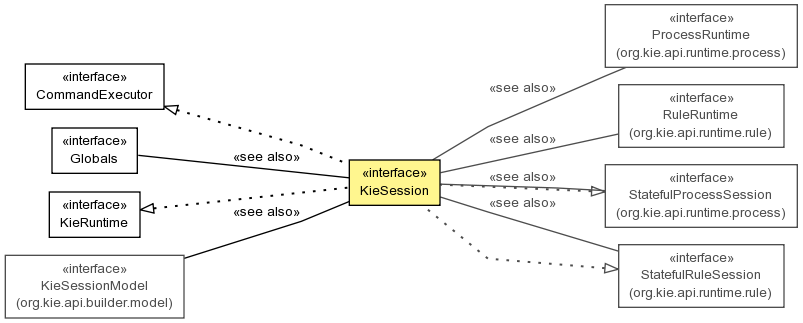
-
- All Superinterfaces:
- CommandExecutor, EntryPoint, KieRuntime, KieRuntimeEventManager, ProcessEventManager, ProcessRuntime, RuleRuntime, RuleRuntimeEventManager, StatefulProcessSession, StatefulRuleSession
public interface KieSession extends StatefulRuleSession, StatefulProcessSession, CommandExecutor, KieRuntime
KieSession is the most common way to interact with the engine. A KieSession allows the application to establish an iterative conversation with the engine, where the state of the session is kept across invocations. The reasoning process may be triggered multiple times for the same set of data. After the application finishes using the session, though, it must call thedispose()method in order to free the resources and used memory.Simple example showing a KieSession executing rules for a given collection of java objects.
KieServices kieServices = KieServices.Factory.get(); KieContainer kContainer = kieServices.getKieClasspathContainer(); KieSession kSession = kContainer.newKieSession(); for( Object fact : facts ) { kSession.insert( fact ); } kSession.fireAllRules(); kSession.dispose();Simple example showing a stateful session executing processes.
KieSession kSession = kbase.newKieSession(); kSession.startProcess("com.sample.processid"); kSession.signalEvent("SomeEvent", null); kSession.startProcess("com.sample.processid"); kSession.dispose();KieSession support globals. Globals are used to pass information into the engine (like data or service callbacks that can be used in your rules and processes), but they should not be used to reason over. If you need to reason over your data, make sure you insert it as a fact, not a global.
Globals are shared among ALL your rules and processes, so be especially careful of (and avoid as much as possible) mutable globals. Also, it is a good practice to set your globals before inserting your facts or starting your processes. Rules engines evaluate rules at fact insertion time, and so, if you are using a global to constraint a fact pattern, and the global is not set, you may receive a
NullPointerException.Globals can be resolved in two ways. The KieSession supports getGlobals() which returns the internal Globals, which itself can take a delegate. Calling of setGlobal(String, Object) will set the global on an internal Collection. Identifiers in this internal Collection will have priority over the externally supplied Globals delegate. If an identifier cannot be found in the internal Collection, it will then check the externally supplied Globals delegate, if one has been set.
Code snippet for setting a global:
KieSession ksession = kbase.newKieSession(); ksession.setGlobal( "hbnSession", hibernateSession ); // sets a global hibernate session, that can be used for DB interactions in the rules. for( Object fact : facts ) { ksession.insert( fact ); } ksession.fireAllRules(); // this will now execute and will be able to resolve the "hbnSession" identifier. ksession.dispose();Like StatelessKieSession this also implements CommandExecutor which can be used to script a KieSession. See CommandExecutor for more details.
- See Also:
Globals
-
-
Method Summary
Methods Modifier and Type Method and Description voiddestroy()Destroys session permanently.voiddispose()Releases all the current session resources, setting up the session for garbage collection.intgetId()Deprecated.longgetIdentifier()-
Methods inherited from interface org.kie.api.runtime.rule.StatefulRuleSession
fireAllRules, fireAllRules, fireAllRules, fireAllRules, fireUntilHalt, fireUntilHalt
-
Methods inherited from interface org.kie.api.runtime.CommandExecutor
execute
-
Methods inherited from interface org.kie.api.runtime.KieRuntime
getCalendars, getChannels, getEnvironment, getGlobal, getGlobals, getKieBase, getSessionClock, getSessionConfiguration, registerChannel, setGlobal, unregisterChannel
-
Methods inherited from interface org.kie.api.runtime.rule.RuleRuntime
getAgenda, getEntryPoint, getEntryPoints, getQueryResults, halt, openLiveQuery
-
Methods inherited from interface org.kie.api.runtime.rule.EntryPoint
delete, delete, getEntryPointId, getFactCount, getFactHandle, getFactHandles, getFactHandles, getObject, getObjects, getObjects, insert, retract, update
-
Methods inherited from interface org.kie.api.runtime.process.ProcessRuntime
abortProcessInstance, createProcessInstance, getProcessInstance, getProcessInstance, getProcessInstances, getWorkItemManager, signalEvent, signalEvent, startProcess, startProcess, startProcessInstance
-
Methods inherited from interface org.kie.api.event.KieRuntimeEventManager
getLogger
-
Methods inherited from interface org.kie.api.event.rule.RuleRuntimeEventManager
addEventListener, addEventListener, getAgendaEventListeners, getRuleRuntimeEventListeners, removeEventListener, removeEventListener
-
Methods inherited from interface org.kie.api.event.process.ProcessEventManager
addEventListener, getProcessEventListeners, removeEventListener
-
-
-
-
Method Detail
-
getId
@Deprecated int getId()
Deprecated.Deprecated. usegetIdentifier()instead- Returns:
- id of this session
-
getIdentifier
long getIdentifier()
-
dispose
void dispose()
Releases all the current session resources, setting up the session for garbage collection. This method must always be called after finishing using the session, or the engine will not free the memory used by the session. If a logger has been registered on this session it will be automatically closed.
-
destroy
void destroy()
Destroys session permanently. In case of session state being persisted in data store it will be removed from it otherwise it falls back to default dispose() method. NOTE: Name and location of this method will most likely change before 6.0.Final as it applies only to persistent sessions
-
-